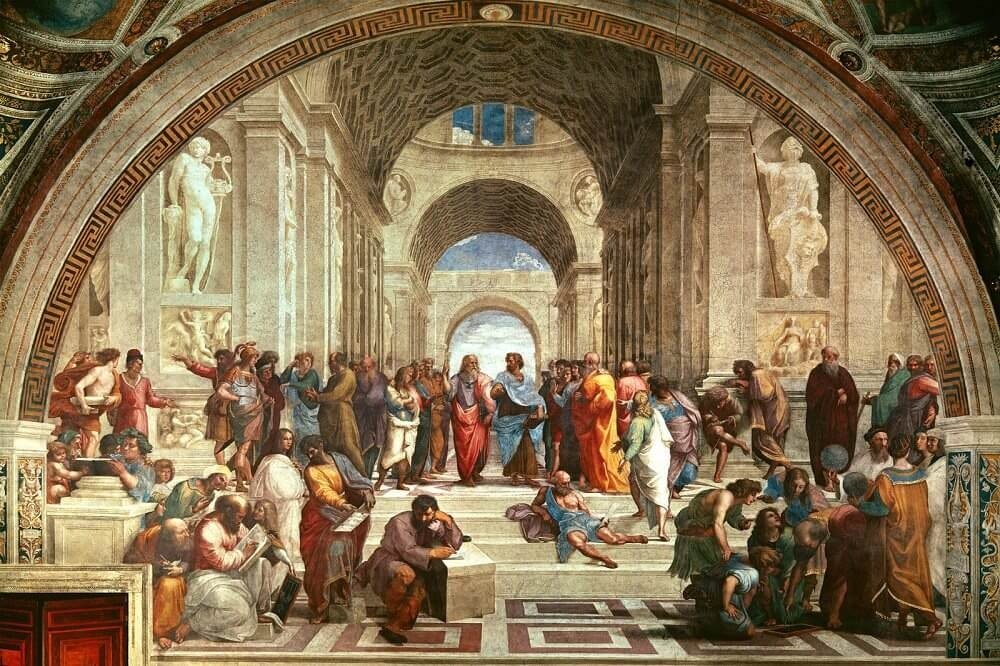Republic or Democracy
Imperfect Union November 2021
School of Athens by Raphael
Over the weekend I received an email from a person that had listened to a podcast episode and asked why I referred to the United States as a democracy. He wrote that surely I knew the nation is actually a republic, but if I wasn’t familiar with that history, he’d be happy to summarize it for me.
While I elected not to respond to that particular email, I’ve been thinking about the subject a fair bit the last few days. First, let’s get our terms right. The framers of the Constitution did fear democracy, but they did not think of democracy the same way we do. They meant the very literal version—a group of people coming together to govern a society directly. They thought about Ancient Greece and the fragility of that type of government—which Madison described in the Federalist Papers: “a society consisting of a small number of citizens, who assemble and administer the government in person.” On the other hand, he described as a republic as “a government in which the scheme of representation takes place.” So literally any system in which there are elected representatives was considered some form of republic.
On the other hand, in 2021, Merriam-Webster offers two definitions of democracy:
“a form of government in which people choose leaders by voting”
“an organization or situation in which everyone is treated equally and has equal rights”
Ok, now that we have those terms out of the way, let’s do a bit of analysis. The Constitution created a representative democracy in which eligible citizens vote for their leaders. How democratic that system has been or will be depends on whether each citizen can vote and whether their vote carries the same weight. To be sure, our system is more democratic now than it was in 1789, when only propertied white men were eligible to vote. But it is not perfectly democratic, as onerous restrictions on voting rights make it harder for some people to vote than others, and the representation in the Senate is wildly unequal. But don’t get me started on that, as it’s the subject for another day.
So why do people persist in making this argument that is so clearly based on a rhetorical fallacy? Most recently, Rep. Dan Crenshaw and Senator Mike Lee, embraced this logic and it is often deployed to defend unequal representation for certain states or communities. As in, it’s perfectly fine that by 2040, 70% of Americans will be represented by 30 senators, while the remaining 30% will have 70 senators. That sort of unequal representation is to be expected under a republic.
All that is well and fine, but the question to which I regularly return is why do people so desperately want to defend a system that is inherently unequal? Why is a democracy a bad thing? For Mike Lee, the answer is pretty obvious. His home state of Utah with roughly 3.2 million residents has the same number of senators as California, with it’s 39.5 million residents. The power of his vote would be significantly diluted if we had more equitable representation and the power of his party would be threatened if all citizens’ votes counted the same way.
But why is a random person so committed to a republic v. a democracy? Since we vote for representatives either way, why not have the most equitable system we can? Here’s how I think of it. If I’m in the running to win a prize, I don’t want the rules to exclude the best competition. I want my work judged against the best. If I game the rules to ensure that no legitimate competition stands a chance, I might win, but that victory would be pretty shallow.
That’s how I think of representation, voting, and democracy. I know it’s an imperfect metaphor (they really aren’t my strength), but I think the principle holds. Politicians should run based on their values and principles, not based on how many voters they can keep from the polls. Similarly, if your rights depends on limiting those of others, that says far more about you than it does the political system.
If you’d like to read more on the subject, I recommend these articles:
Jamelle Bouie, “Alexandria Ocasio-Cortez Understands Democracy Better Than Republicans Do,” New York Times.
George Thomas, “‘America Is a Republic, Not a Democracy’ Is a Dangerous—And Wrong—Argument,” The Atlantic.
